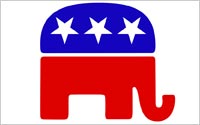 With many pundits and grassroots
organizers calling for a reexamination of the conservative movement’s positioning and prospects following Barack Obama’s victory in November, the Republican National Committee has
published a bluntly critical assessment detailing the GOP’s failings and setting forth a strategy for political victory.
With many pundits and grassroots
organizers calling for a reexamination of the conservative movement’s positioning and prospects following Barack Obama’s victory in November, the Republican National Committee has
published a bluntly critical assessment detailing the GOP’s failings and setting forth a strategy for political victory.
The “Growth & Opportunity Project” report covers
a lot of ground -- from adjusting messaging about economic policies to building more support among minority voters to changing the primary schedule. But at the tactical level, some of the most
important suggestions concern the party’s approach to media, reflecting the central role of persuasion in achieving political goals.
Many of the RNC’s worries will sound
familiar to media buyers and planners. The report frets that “continued audience fragmentation means media plans must incorporate increasingly diverse mixes of broadcast television, cable
television, Hispanic advertising, sports programming, radio, Internet advertising, social media, mobile, and other emerging media, such as online television viewing and radio listening.”
advertisement
advertisement
But according to the RNC, Republicans (at least at the national level) have lagged behind Democrats in adopting new media, as well as new data resources and analytics for planning media buys.
Here, the RNC notes, some Republican media agencies are already using cutting-edge data analysis, but continue to face resistance because of the expense involved: “Media data can
improve efficiencies by 10% to 25%, but it is not free -- there are the additional costs of data acquisition, analysis and implementation.”
Greater personnel needs also require bigger
budgets, as “new online media require much more active staff and daily tweaking than traditional media.” There’s also simple institutional inertia, as “most managers are
uncomfortable admitting that they do not really know… what cookies do.”
While “media decisions are made at the campaign level,” meaning the RNC has limited
influence, it can still “play a role in creating a ‘culture of data’ that includes the media function.” To this end, the RNC calls for “the creation of a new data
platform accessible (through rentals, subscriptions, licenses or data exchange agreements) to all qualified Republican organizations and campaigns." Beyond that, it recommends founding “a data
analytics institute that can capture and distill best practices for communication to and targeting of specific voters.”
Media (both new and traditional) plays a key role in the
RNC’s larger plan to sway voters from minority groups -- especially Hispanics, a large, fast-growing group with the potential to decide key swing states like Florida, Arizona, Colorado, and
Nevada. In addition to basic changes, which include finessing (or totally revamping) the GOP’s stance on immigration and the role of government, the report asserts that “The RNC must
invest financial resources in Hispanic media.”
Indeed, “In a $1 billion campaign, much less than 1 percent of the total budget was spent on Hispanic or other demographic group
oriented media.” More to the point, OFA (Obama for America) “was outspending us 8 to 1 in these media markets.” In short, “If we are going to attract these groups to our Party
and candidates, our budgets, and expenses need to reflect this importance.”
Media will also be key to reaching younger voters. No surprise -- the RNC devotes a great deal of
attention to social media: “We also need to communicate with young voters where they get their information. We can’t use old communication tools for young voters.” This means
approaching younger voters via channels including “Twitter, Facebook, Reddit, and Instagram.” This is a daunting task, given how rapidly this part of the media environment is evolving).
But traditional media shouldn’t be discounted in the push to reach youth: “Republican leaders should participate in and actively prepare for interviews with 'The Daily Show,'
'The Colbert Report,' MTV and magazines, such as People, Us Weekly, as well as radio stations that are popular with the youth demographic.” College newspapers and media
lists were also cited.
Indeed, the RNC emphasizes that traditional media can still be highly effective, but here as well, the Democrats have been outpacing Republicans in applying the latest
methods: “On television, Obama ran at least four separate media schedules, each with a different series of creative executions.”
Republican campaigns will have to step up
their game (and increase their budgets) to match this kind of segmentation and specificity. And again, data is of crucial importance. RNC says it will explore relationships with consumer research
organizations to “create greater awareness about the importance of data-driven decisions in media buying and placement.”